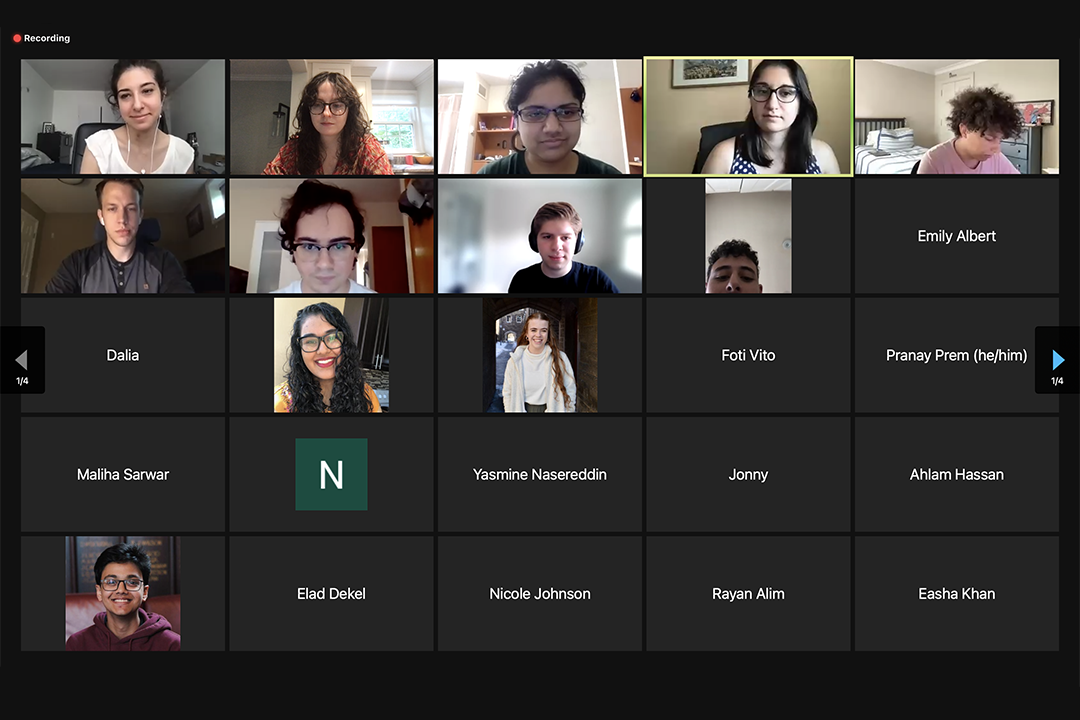At a contentious July 25 meeting, the University of Toronto Students’ Union (UTSU) Board of Directors voted to re-sign an open letter written by the Muslim Students’ Association (MSA) after previously voting to un-sign it. During an emergency meeting on July 4, some board members accused the letter of being antisemitic and the board voted to rescind the signature.
The letter, entitled “Open Letter to the University of Toronto Administration to Condemn the Palestinian Genocide,” asks the school to recognize the violence in Israel and Palestine, acknowledge its effects on Palestinian students, discontinue a Munk School trip to Israel, and improve hiring practices following a hiring controversy in the Faculty of Law.
During the meeting, UTSU President Alexa Ballis explained why the Executive Committee initially decided to sign the letter and explained why the motion to sign the letter was being brought up again. Ballis said that the July 4 meeting — which was called specifically to vote on rescinding the signature — was not well advertised to students, lacked Palestinian voices, and created a hostile environment in which students may not have felt they could vote how they wanted to. She added that a lot of students had approached the executives with concerns about the later vote to rescind the signature.
At some points during the July 25 meeting, it had over 100 participants, and students with perspectives on both sides of the issue spoke about it, with many strongly against and many strongly in agreement with signing the letter.
Besides the debate over the MSA letter, directors heard updates from executives on their work and voted to add three seats to the Equity and Accessibility Committee.
MSA letter discussion
During the June 25 meeting, Elad Dekel, one of the UTSU’s Innis College directors, argued that the letter was antisemitic in nature because it employed false definitions and applied a double standard to Israel with regards to human rights issues. He specifically argued that the usage of terms such as ‘apartheid,’ ‘genocide,’ and ‘ethnic cleansing’ was not factually accurate, noting that there are people of Arab descent who live in Israel with full legal rights.
Dekel also stated that the letter alienated Jewish and Israeli students at U of T, because he believes it applies different standards to Israel than to other countries in the same position. He said that this would go against the International Holocaust Remembrance Association’s (IHRA) definition of antisemitism, which lists “Denying the Jewish people their right to self-determination” and “applying double standards [to Israel]” as examples of antisemitism.
At the July 25 meeting, University College Director Muskan Nagra, who moved the motion to re-sign the letter, said that re-signing the letter is an important gesture for Palestinian students at U of T.
“Our student union has constantly undermined the suffering of Palestinian Muslim students, and it’s frustrating,” said Nagra, citing two statements released by the UTSU in support of Palestinian students in recent months, which were criticised by some students for failing to fully address the issue.
Nagra also pointed to the mental health aspect of the MSA letter, arguing that the UTSU cannot reasonably advocate for Palestinian students’ mental health while not acknowledging the injustices occuring in Palestine.
“While we have no control over the situation in Israel and Palestine, we do have control as to whether or not our students feel supported,” said Nagra.
Following debate, directors voted to allow any U of T student to speak at the meeting, including students from UTSC and UTM and graduate students.
A number of students spoke on the issue, including students with ties to both Palestine and Israel. Debate ranged on topics from whether the MSA letter is antisemetic to the definition of genocide.
The meeting was also recorded and posted to the UTSU’s website for public viewing.
Other business
Besides the debate over the MSA letter, the board heard updates from executives on their work from the last month, including collaborations with student groups on campus, updates on orientation, reports they are working on, and other plans for the fall semester.
Notably, Catherine Lai, vice-president public & university affairs, said that the executives have been in the process of meeting with administration to discuss potential issues with vaccinations, quarantine, and other factors related to COVID-19 as students return to campus for the fall. The UTSU, she said, continues to advocate for a hybrid or partially online model for classes in the fall to accommodate international students or others who cannot make it back to campus.
The board also voted to add three additional seats to the Equity & Accessibility Committee, which were filled at the meeting.


